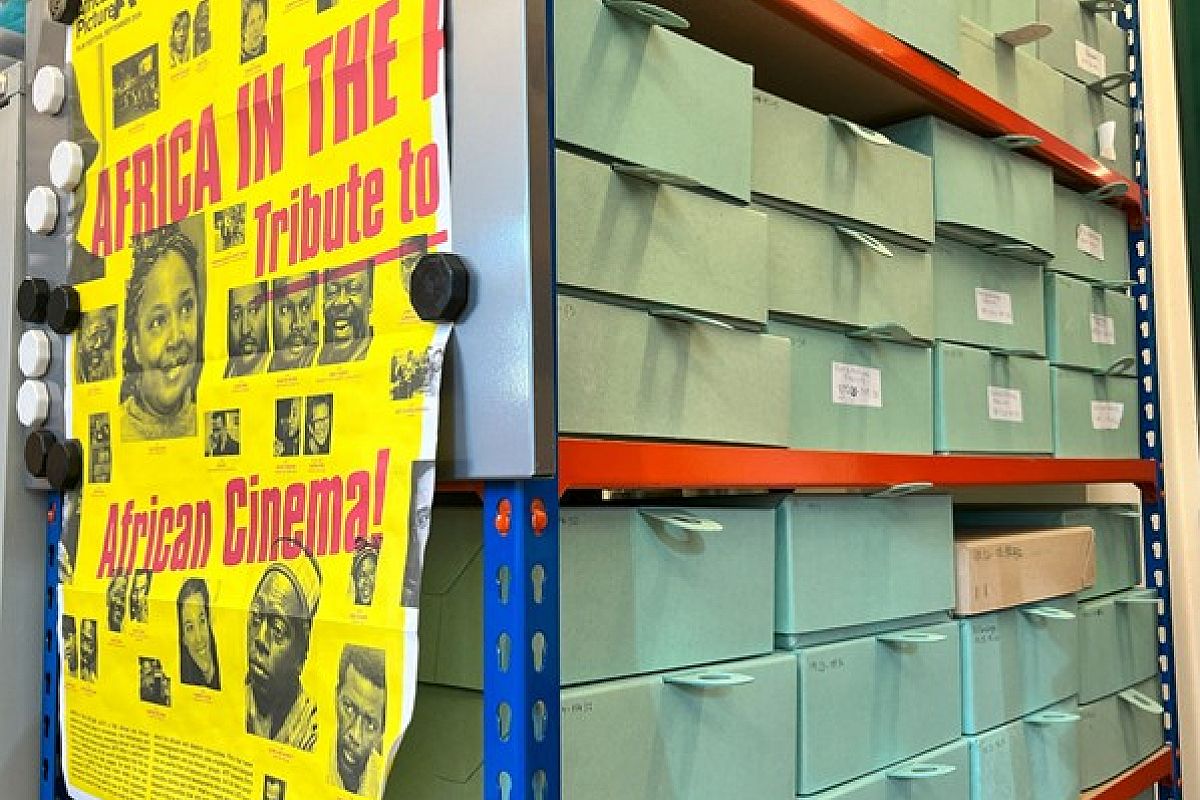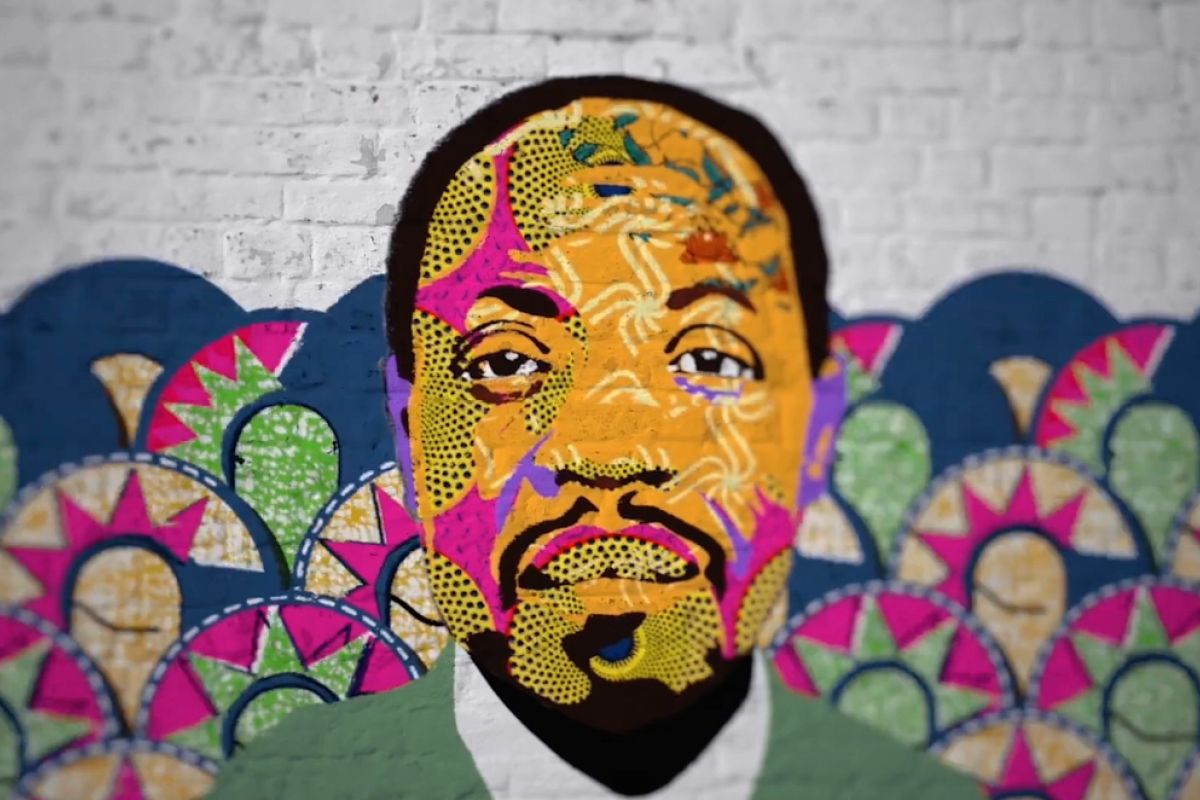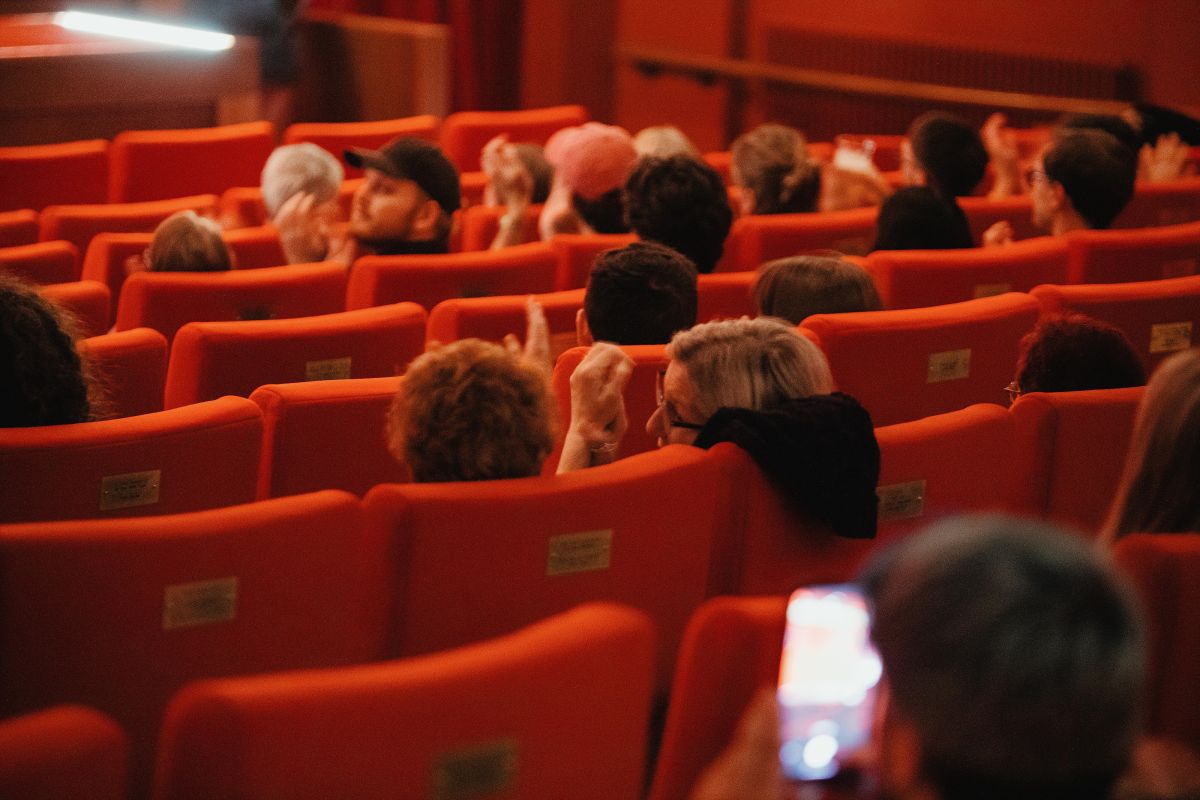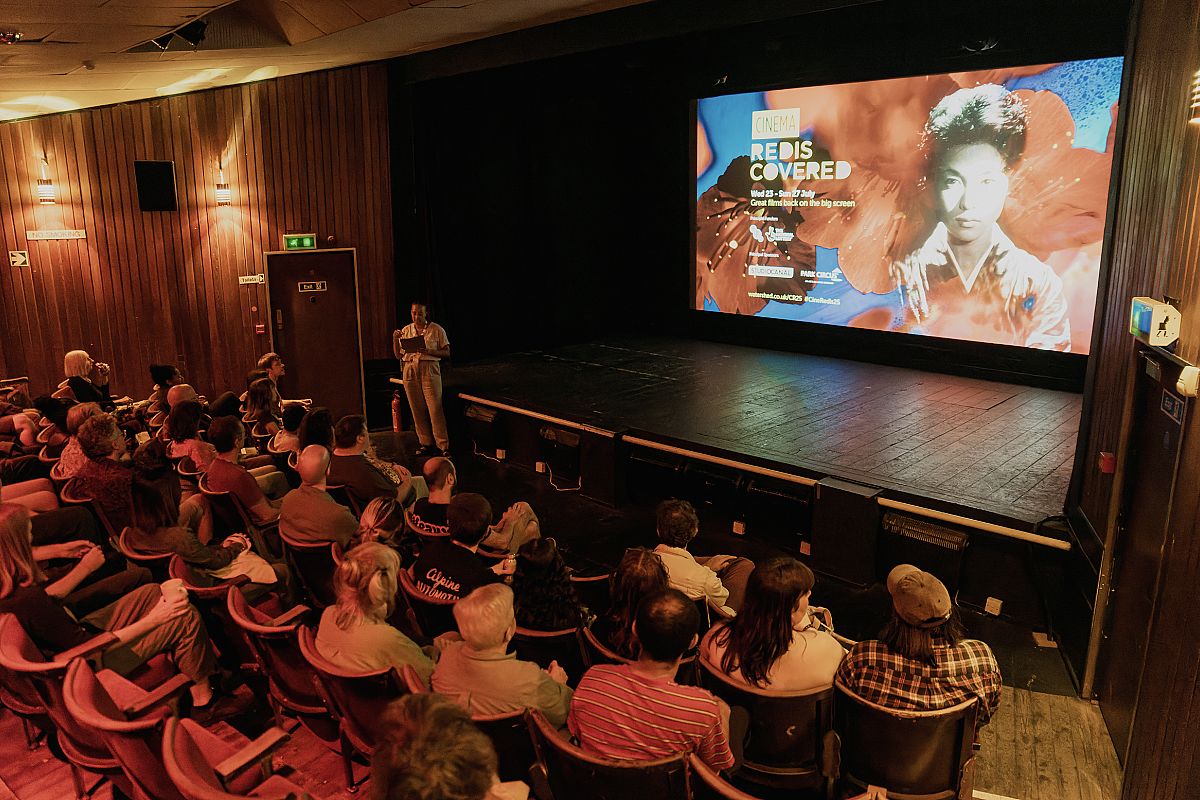
Curating with PanAfrican Cinema Archives
A traineeship programme at HPPH with June Givanni PanAfrican Cinema Archive (JGPACA) and Cinema Africa!
In conjunction with the Building a PanAfrican Screen Heritage programme, this collaborative training programme, developed by the June Givanni PanAfrican Cinema Archive and Cinema Africa! At Hyde Park Picture House, offers participants a unique opportunity to explore film curation through the lens of a globally significant Black-led archive.
This is an opportunity to learn all about PanAfrican cinema, how to curate a film event and how to work with archives.
Created with the support of the BFI Screen Heritage Fund, awarding National Lottery funding.
Course Objectives
Participants will:
- Deepen their understanding of film curation through structured training and archival exploration.
- Engage critically with materials from JGPACA, considering curatorial responsibility, diasporic memory, and the politics of representation.
- Respond to the learning from films, objects, themes, and ideas on the course and archive, by creating a reflective output (writing, video etc), and curate a film screening event.
- Join an online, peer-led curatorial conversation, positioning their reflections within a wider network of archival dialogue and collective learning with the JGPACA Lead Curators.
- Be encouraged to consider how their engagement with the materials and histories of PanAfrican cinema might be extended, as part of a long-term relationship with JGPACA, Cinema Africa, and/or curatorial practice.
About The June Givanni PanAfrican Cinema Archive (JGPACA)
The June Givanni PanAfrican Cinema Archive (JGPACA) was set up officially in 2013, and is a living archive that preserves and values the history of Black cinema globally. At its core is the interest of Pan-African cinema and its relationship with Black British cinema and culture. To date, the JGPACA holds more than 10,000 items, connecting African film with the film cultures of diaspora communities in the Americas, the Caribbean and Europe. The archive’s collection, which encompasses the rich history of Black British arts with roots in the African diaspora, is evidenced in its international and global perspectives.
The archive provides a crucial knowledge base to films and filmmakers, linking the pre-digital age through to contemporary achievements. JGPACA is a unique collection of items, objects and components: films and programmes recorded on video and DVD, photographs, audio interviews, posters, scripts, paper documents, books, journals, film and festival publicity materials and memorabilia. Its PanAfrican focus makes it a key resource for those interested in diaspora histories.
JGPACA recognises the potential that exists, to serve a larger and wider community of users, extending beyond its London-centred location, and linking its PanAfrican networks regionally and to Africa, the Caribbean, the Americas and Europe. Importantly, JGPACA seeks to enable audiences and participants (communities) in the project to develop their cultural awareness, with a recognition of the complexities of Black identities. JGPACA has received funding from BFI Screen Heritage fund to extend its support and knowledge to other UK regions.
JGPACA Staff Team:
JGPACA Directors – Imruh Bakari, June Givanni and Emma Sandon
Lead Curators – Imruh Bakari and June Givanni
Project Curator – Damilola Lemomu
Project Facilitators – Benjin Pollock and Phoebe Beckett Chingono
What is Cinema Africa! At Hyde Park Picture House?
Cinema Africa! is a permanent film strand at Hyde Park Picture House (HPPH) cinema in Leeds, in which between 3 – 5 Pan-African films a month are screened to both African and non-African audiences. It is a new programme of activity launched with the reopening of Hyde Park Picture House after a three-year redevelopment, including the introduction of a new second screen and accessible features to the building. The Cinema Africa! strand is programmed by the Creative Engagement Officer of HPPH, Mosa Mpetha, in collaboration with local communities, programmers and national and international co-curators.
Who is the Lead Curator/Programme Lead, Mosa Mpetha?
Mosa Mpetha at Hyde Park Picture House is one of the partners JGPACA is working with to seek ways to influence wider curricula activity in arts education, develop research through innovative use of archival materials, curating and exhibition with interactive modes of practice. Based in Leeds, and from Liverpool & South Africa, Mosa Mpetha is a film curator of Black, African and Archive films. Mosa co-founded Black Cinema Project, an evolving space for Black people to gather and watch and discuss films with care; and she curates Cinema Africa! a permanent African film strand at Hyde Park Picture House screening 3-5 films a month in partnership with local African communities.
Mosa is a supporter of and advocate for DIY exhibitors, she is involved in the Scalarama Leeds Film Festival, she created the Leeds Film Network and mentors new programmers.
Mosa has a passion for archive films and, in particular, the preservation and protection of African heritage. She is a part-time digital projectionist and is undertaking training in 16mm print projection and archival film practice.
About the training opportunity
What will I learn?
Over eight weeks, supported by Cinema Africa curator Mosa Mpetha, industry guests and the Hyde Park Picture House team, you will learn about Pan-African cinema, film curation, working with archives and how to put on your own film event. Each session will have presentations, workshops and activities, and reflection time. The trainees will create their own record of learning through a journal, video or another kind of creative medium.
As well as the workshop sessions, the trainees will have opportunities to:
- Watch and research Pan-African cinema tailored to their interests
- Attend local events to enhance their learnings
- Read relevant books and resources
- Create their own film event based on their learnings.
The structure of learning is:
Week 1 – What is PanAfrican and Archive Curation
Week 2 – How to find and research films
Week 3 – Learning about JGPACA and archiving curation
Week 4 – Film Licencing and the work of Menelik Shabazz
Week 5 – Cinema Making and Local Archives
Week 6 – Finding audiences and Regional Film Archives
Week 7 – Projection and Physical Media
Week 8 – Reflections & Planning a Film Event
How will this help me?
This training will help you understand PanAfrican Cinema and the global significance of Black British cinema as a diaspora cinema. It will help you to understand relevance to transnational histories with African diaspora communities, and to develop skills & knowledge in film programming & working with archives
It will be useful to you if you are considering going into a career in film programming, working with archives or putting on your own cultural events.
Who is it for?
The training is for Black and Black Mixed individuals based in Leeds or West Yorkshire, who have a curiosity and interest in learning about Pan-African Cinema. You do not need to have work experience in film or archives, or any experience in film. You just need to have a curious mind and an enthusiasm to learn.
The reason this opportunity is targeted is because Cinema Africa has an aim to increase opportunities in film for Black people in the Leeds and West Yorkshire area, recognising that the film and archives sector is hugely underrepresented by Black people, even though there is a gradual increase in interest in Black film content.
Where will it take place?
The training will take place in Hyde Park Picture House in the Hyde Park area of Leeds. The address is: 73 Brudenell Rd, Leeds, LS6 1JD.
We will hold most sessions in the community room, but there will also be screenings and activities to attend in other parts of the building. The building is accessible, and if you want to find out more about the building and how to get there, you can read here.
What are the training dates?
- Week 1 – Tuesday 30 September 10am – 4pm
- Week 2 – Tuesday 7 October 10am – 4pm
- Week 3 – Saturday 11 October 10am – 1pm & 5.30pm - 8pm
- Week 4 – Sunday 19 October 10am – 5pm
- Week 5 – Tuesday 28 October 10am – 4pm
- Week 6 – Tuesday 4 November 10am – 4pm
- Week 7 – Tuesday 11 November 10am – 4pm
- Week 8 – Tuesday 18 November 10am – 4pm
As well as the training sessions, there will be a weekly research film screening on Thursday mornings at 10am – 12pm from Thursday 2 October – Thursday 20 November.
As part of the opportunity, we will arrange free access to local relevant cultural events to enhance the learning.
Do I have to attend all of it?
You should only apply if you can attend at least seven of the eight weekly sessions. This is to ensure you get the most out of the learning experience. Aside from the weekly sessions, there will also be optional weekly research screenings to attend, and opportunities to attend other local relevant cultural events.
Trainee bursary:
Each trainee will be allocated a bursary of £784, inclusive of tax. There are no travel or other expenses included, but trainees will be provided with learning resources. Trainees can apply to the BFI Individual Skills Fund for travel and other expenses.
This bursary is based on a £14 per hour hourly rate, for 56 hours over the 8 weeks. Your total learning hours in the weekly sessions will be 47.5 hours, so you have a remaining 8.5 hours to contribute towards your optional weekly film screenings and local event attendance.
The bursary will be paid in week four of the training, once you submit an invoice. You are responsible for your own National Insurance and tax contributions. If you need support creating an invoice, we can help.
How do I apply?
To apply for this opportunity, please click on the link below and answer the questions. The application form has some questions about your contact information, and only one application question which is ‘why you are applying for this opportunity?’ APPLY HERE.
You must submit your application by Sunday 24 August 2025.
What happens next?
Once the application deadline has passed, we will shortlist the applicants and invite a selection for an informal conversation online.
We will then select the three trainees and let them, and the unsuccessful trainees know by Friday 5 September.
The three selected trainees will start on Tuesday 30 September.
What if I have a question?
If you have any questions, you can get in contact directly with Mosa on mosa@hpph.co.uk


